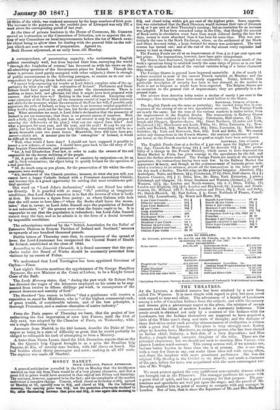A correspondent, of penetrating sagacity, who understands English politics excedingly
well, but lives beyond their bias, surveying the world "through the loopholes of retreat," has favoured us with his views on the all-absorbing question of the Government plans for Ireland. Though his letter is private, (and partly occupied with other subjects,) there is enough of public concernment in the following passages, to excuse us to our cor- respondent for placing them before our readers- " I cannot help expressing my wonder at Lord John's complete miss of the op- portunity for what you call 'the redemption of Ireland.' Parliament and Great Britain would have agreed to anything, under the circumstances. There is nothing so large, bold, and effectual, but that it might have been proposed with success. And what have we? Nothing in the least effectual. Excepting only some extension of the Poor-law, all the measures consist of sops to Irish interests and shifts for the moment; whilst the extension of the Poor-law will, if possible, only aggravate the evils of Ireland, so long as there is an immense surplus popnlatisn; being itself a thing good, not for the cure, but forthe prevention of excessive num- bers. What astonishes me most, is Lord John's declaration that the peasantry of Ireland is not too numerous; that there is no present excess of numbers. With such a faith, (if he really holds it, and has not uttered it only for the purpose of covering the deficiencies of his plan,) what can one expect from him? And what a prospect for next year, and the next, and the next! It may be my stu- pidity, but for the life of me I cannot help thinking, that everything will be in a MORE incurable state two years hence. Meanwhile, lives will have been pre- served—that's all. A meaner plan for the redemption' of Ireland, it would be difficult to imagine.
" Well, what would I have done? I should not have supposed it possible to invent a new scheme, of course. I should have gone back to the old story of the Poor Inquiry Commissioners, and proposed—
"let, A real Elizabethan Poor-law, in order to make the owners of the soil responsible for the decent wellbeing of the people.
" 2d, Agreat (a sufficient) diminution of numbers by emigration--or, let us call it, Irish colonization; the object being to qualify Ireland for the operation of A real poor-law.
" 3d, As much soup as you please, for the preservation of life whilst the other measures were working.
"4th, Settlement of the Church question; because, do what else you will, you cannot have a happy Catholic Ireland with a Protestant Ascendancy Church; and because this is a grand opportunity for settling that most troublesome poli- tical question."
One word on "Lord John's declaration," which our friend has taken too directly. It is guarded with so many "ifs," pointing at imaginary conditions, that Lord John's assertion is in fact the reverse of what it looks at first. He borrows a figure from poetry: as where Galatea tells Adis that she will cease to love him—" when the flocks shall leave the moun- tains," that is, never; so Lord John Russell says the population of Ireland is not redundant, "if" the present were what the future ought to be. It is unpopular to say that the population is redundant; but Lord John Russell cannot deny the fact, and so he admits it in the form of a denial inverted by impossible conditions.


































 Previous page
Previous page